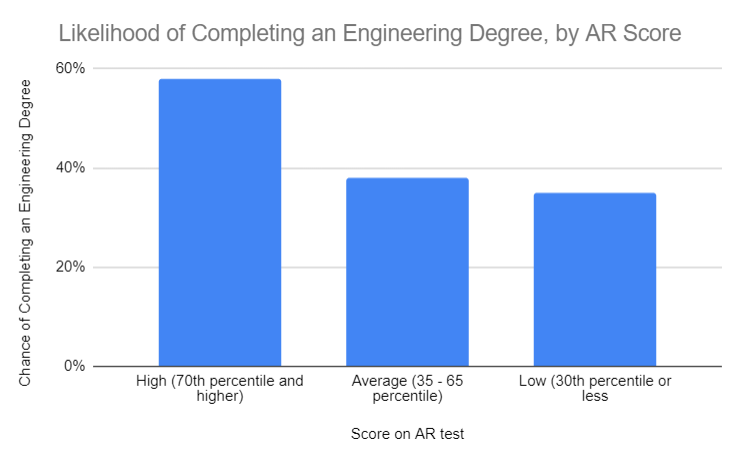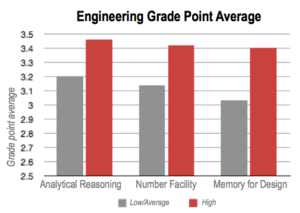In 2012, Dr. Chris Condon, a former Research Department researcher who is now a consultant for the Foundation, and David Schroeder completed our study of engineering students in the College of Engineering at the University of Texas. In this study, we tested the aptitudes of 256 freshmen in the engineering school. We then followed them through their undergraduate experience and looked at their grades and graduation rates.
As a group, the engineering students scored higher than the general testing population in several aptitude areas:
Graphoria (clerical speed)
Foresight (seeing possibilities)
Memory for Design
Number Series (numerical reasoning)
Number Memory
Mathematics Vocabulary
Successful and unsuccessful students
About half of the 256 students who began the study as freshman engineering students graduated with engineering degrees. The students who successfully completed an engineering degree scored significantly higher than students who did not complete their degrees on our tests of:
- Analytical Reasoning
- Number Series
- Number Facility
- Incomplete Open Cubes
- Tonal Memory
- Number Memory
- English Vocabulary
- Mathematics Vocabulary

The difference in scores on Analytical Reasoning was particularly notable, with students scoring high having a greater chance of graduating in engineering.
Engineering majors by degree specialty
In terms of engineering degree specialties, mechanical engineering majors excelled on Inductive Reasoning, Incomplete Open Cubes, and Spatial Visualization. Electrical and chemical engineering majors excelled on the two vocabulary tests.
Grade point averages
In engineering courses, students scoring in the high range in Analytical Reasoning, Number Facility, and Memory for Design tended to have better grades than those scoring lower on the same tests.
English Vocabulary, Math Vocabulary, and Foresight all showed positive correlations with overall GPA for those in the sample.

The full study is presented in Technical Report 2012-2.
Interested in studying Engineering? Read more about the major at UT Austin, or about engineering in general.
















